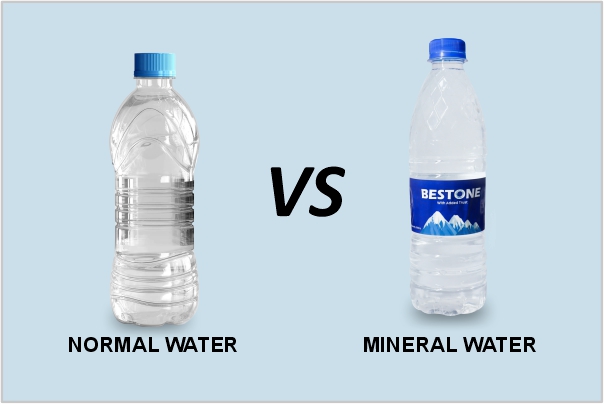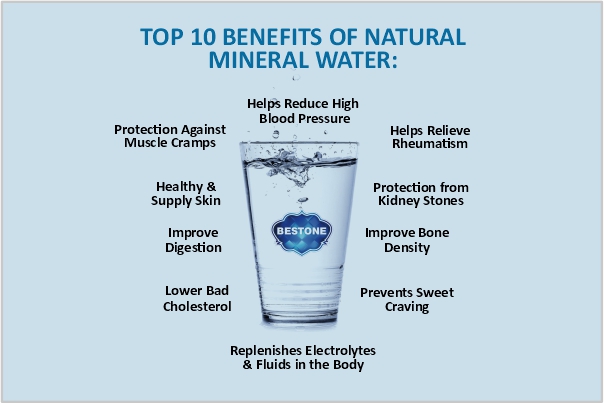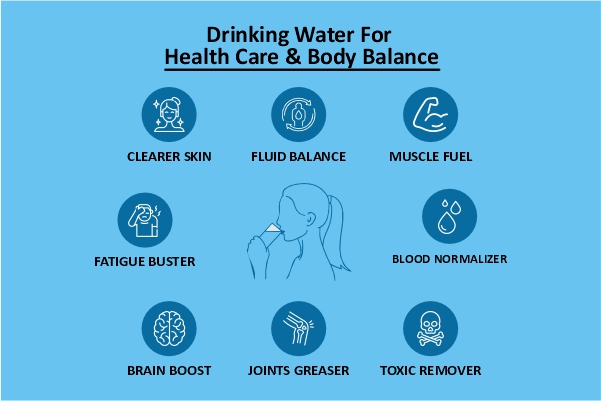
Mineral water is often praised for its natural purity and mineral composition, derived from underground reservoirs that give the water its distinctive characteristics. Still, not all bottled water can be classified as mineral water. Let’s discuss what is mineral water and their differences and benefits in more detail.
What is Mineral Water?
Mineral water is sourced from natural underground springs or wells that are protected from environmental contaminants. It must contain specific levels of minerals and trace elements, naturally present in the water due to its geological formation. Unlike tap water or some bottled waters, mineral water cannot undergo significant treatment or alteration before bottling to retain its natural composition.
Key Characteristics of Mineral Water:
- Natural Source: Bestone Water, for instance, originates from deep underground springs known for their mineral-rich content.
- Mineral Composition: It contains essential minerals like calcium, magnesium, potassium, and others, which are beneficial for health.
- No Chemical Treatment: Mineral water is bottled directly at the source without undergoing extensive chemical treatments or purification processes.
Is all Bottled Water Mineral Water?

Not all bottled waters are Mineral Water. Some are just regular water, while others contain minerals. Bottled waters, including purified, spring, and flavoured waters, may undergo different processes like filtration, reverse osmosis, or the addition of Flavours and carbonation. These processes can change the taste and composition of water, unlike mineral water which remains unchanged.
Here’s a breakdown of the minerals commonly found in mineral water and their associated benefits!
Calcium:
- Essential for strong bones and teeth.
- Supports muscle function and nerve transmission.
Magnesium:
- Helps regulate muscle and nerve function.
- Important for bone health and energy production.
Potassium:
- Balances fluids in the body.
- Supports heart health and muscle contractions.
Sodium:
- Important for fluid balance and nerve function.
- Helps maintain blood pressure.
Bicarbonate:
- Acts as a buffer to maintain the body’s pH balance.
- Supports digestion and kidney function.
Iron:
- Essential for oxygen transport in the blood.
- Supports immune function and cognitive development.
Zinc:
- Supports immune function and wound healing.
- Important for cell division and growth.
Top 10 Benefits of Natural Mineral Water:

1. Reduce Bad Cholesterol:
- Natural Mineral water may help reduce LDL (Low-Density Lipoproteins) (bad) cholesterol levels due to its magnesium content.
- The Magnesium present in mineral water helps regulate cholesterol synthesis in the body.
- Regular intake as part of a balanced diet may contribute to improving lipid profiles (cholesterol).
2. Helps Reduce High Blood Pressure:
- The presence of minerals such as magnesium and calcium in mineral water may contribute to lowering blood pressure.
- Magnesium helps relax blood vessels, improving blood flow and potentially lowering blood pressure levels.
- Calcium plays a role in regulating blood pressure and muscle function.
3. Healthy & Supply Skin:
- Natural mineral water contains silica, which is known to promote healthy and supple skin.
- Silica contributes to the formation of collagen, which maintains skin elasticity and moisture.
- Regular intake of mineral water may help maintain skin health and appearance.
4. Helps Relieve Rheumatism:
- The presence of sulphate ions in mineral water may help reduce arthritis and rheumatism symptoms.
- Sulphate ions have anti-inflammatory properties that can reduce joint pain and stiffness.
- Regular consumption of mineral water helps maintain joint health and mobility.
5. Protection Against Muscle Cramps:
- Mineral water is rich in electrolytes such as potassium and magnesium, which are essential for muscle functioning.
- Potassium helps regulate muscle contractions, reducing the likelihood of muscle cramps.
- Magnesium plays a role in muscle relaxation, which can prevent cramps and spasms.
6. Improve Bone Density:
- The calcium and magnesium in mineral water are important for maintaining bone health and density.
- Regular intake may improve bone mineral density and reduce the risk of osteoporosis.
- These minerals support bone structure and strength.
7. Protection from Kidney Stones:
- Drinking adequate amounts of water with mineral water may help prevent the formation of kidney stones.
- Mineral water with a balanced mineral composition, including calcium and magnesium, may prevent stone formation.
- It promotes urine dilution and reduces the concentration of stone-forming minerals in the kidneys.
8. Improve Digestion:
- The bicarbonate content in mineral water may help neutralize stomach acid, thereby aiding digestion.
- Drinking mineral water before meals may stimulate digestive enzymes and improve gastric motility.
- This may help reduce symptoms of indigestion and promote overall digestive health.
9. Replenishes Electrolytes & Fluids in the Body:
- Mineral water contains essential electrolytes such as sodium, potassium and magnesium, which are lost through sweat and urine.
- It helps maintain hydration levels and electrolyte balance in the body.
- Regular intake is beneficial to prevent dehydration during physical activity or in hot weather.
10. Prevents Sweet Craving:
- Drinking mineral water can help reduce sugar cravings by providing a refreshing alternative to sweetened beverages.
- It hydrates the body without adding calories or sugar, which can help control weight and cravings.
- The sensation of drinking something flavourful (even if it is lightly mineralised) can satisfy cravings without adding sugar.
Choosing Mineral Water for Health:
When choosing mineral water, such as Bestone Water, consumers prioritize natural purity and the mineral benefits it offers. It’s a great option for individuals seeking to boost their hydration while also obtaining additional nutrients, particularly in areas where tap water quality may be questionable.

- Clear Skin: Mineral water contains silica, which helps improve skin elasticity and promotes a clear complexion by maintaining hydration levels.
- Fluid Balance: The balanced mineral content in mineral water, including potassium and magnesium, helps regulate fluid balance in the body, which is essential for overall hydration and proper bodily functions.
- Muscle Fuel: Mineral water provides electrolytes such as calcium and magnesium, which are important for muscle function and energy production, aiding muscle contractions and preventing cramps.
- Fatigue Reliever: Drinking mineral water helps fight fatigue by replenishing electrolytes lost through sweat or physical exertion, thereby increasing energy levels and reducing fatigue.
- Blood Normalizer: The minerals found in mineral water, such as calcium, magnesium, and potassium, contribute to maintaining normal blood pressure levels and promoting heart health.
- Brain Boost: Proper hydration with mineral water supports brain function and cognitive performance. The minerals in mineral water aid neurotransmission and enhance mental clarity.
- Joint Lubricant: The silica content in mineral water helps maintain joint health by promoting the synthesis of collagen, which supports joint flexibility and reduces inflammation.
- Toxin Remover: Drinking mineral water supports the body’s natural detoxification processes by aiding in the elimination of waste products and toxins through improved kidney functioning.
Environmental Considerations
Packaging for mineral water should prioritize sustainability, utilizing recyclable materials and reducing environmental impact throughout the production and distribution process.
Use of Recyclable Materials:
When choosing packaging materials, it is advisable to choose materials that can be easily recycled, such as PET (polyethylene terephthalate) plastic or glass. These materials can be turned into new bottles or other items, resulting in a reduction in overall waste.
Minimize Packaging:
Try to reduce the amount of packaging used without compromising the safety and quality of the product. This may include using thinner bottles or caps, or exploring creative packaging designs that require less material.
Biodegradable Alternatives:
Consider using environmentally friendly packaging materials that decompose more quickly in the environment than traditional plastics. Bioplastics derived from renewable resources such as corn starch or sugar cane are becoming increasingly popular.
Reduce Carbon Footprint:
Assess the entire lifetime of packaging, from its manufacture to its final disposal. Select suppliers and materials that have a low impact on greenhouse gas emissions and energy use. This may include sourcing materials from nearby suppliers to reduce transportation emissions.
Encourage Recycling:
Encourage consumers to recycle packaging by providing clear labelling and running educational campaigns. Providing guidance on proper disposal methods and locations for packaging can increase recycling rates and reduce litter.
By adopting these strategies, packaging for mineral water can play a role in achieving sustainability objectives by reducing environmental harm and encouraging responsible recycling.
Conclusion
In summary, while all bottled water is packaged in bottles, not all bottled water can be classified as mineral water.
Bestone water stands out due to its natural origin, mineral composition, and health benefits, making it a favoured choice among consumers who prioritize pure and refreshing hydration.
